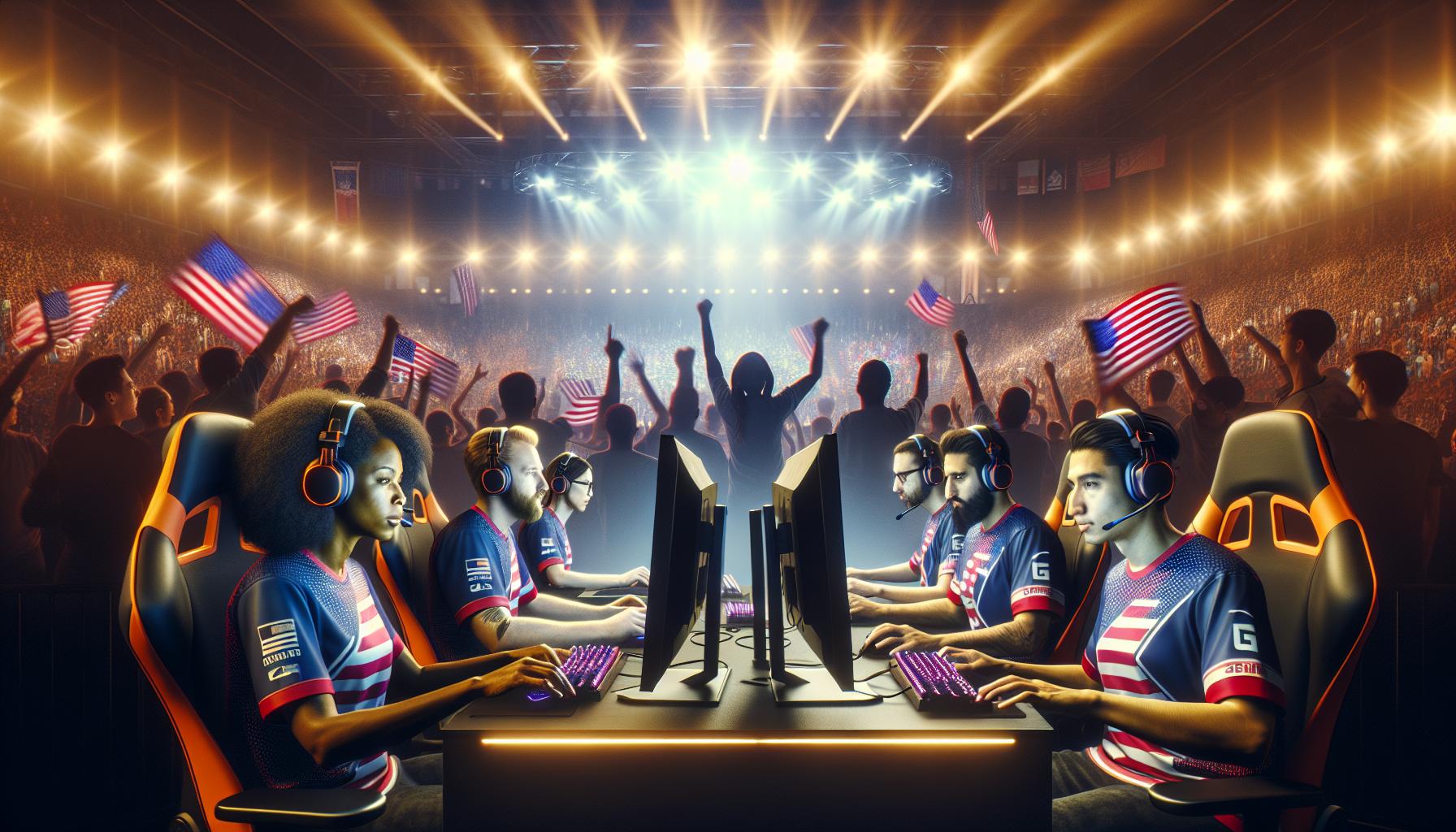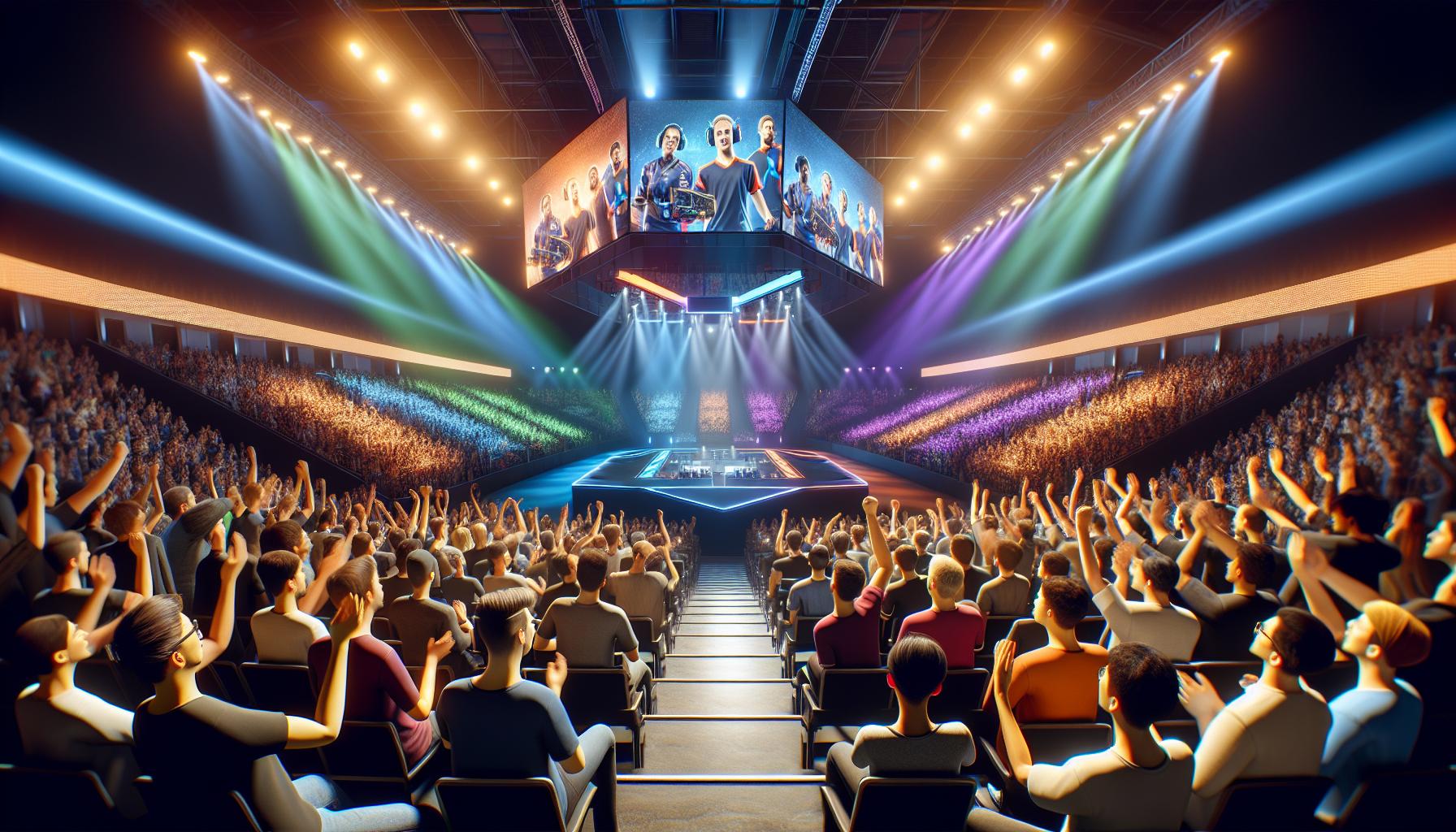Key Takeaways
- Massive Global Audience: Esports draws in over 500 million participants, with major tournaments like the League of Legends World Championship attracting peak viewership of 30 million simultaneously.
- Historic Prize Pools: Prize money in esports has skyrocketed, highlighted by tournaments such as The International 10 for Dota 2, which boasted a prize pool exceeding $40 million.
- Diverse Game Genres: The esports ecosystem encompasses various genres including first-person shooters, MOBAs, battle royale games, and sports simulations, offering something for every type of gamer.
- Career Opportunities: Universities are increasingly recognizing esports, offering scholarships to talented players and integrating esports into educational programs to foster essential life skills.
- Cultural Influence: Esports is not only a gaming phenomenon but also a cultural force; it has gained significant interest from Hollywood and celebrities, further weaving itself into mainstream entertainment.
- Community and Inclusion: Esports promotes diversity and social integration, creating supportive communities while addressing crucial topics such as mental health, representation, and inclusivity in gaming.
Esports has exploded into a global phenomenon, captivating millions with its thrilling competitions and dynamic gameplay. From casual gamers to professional teams, the world of esports offers something for everyone. But beneath the surface of this vibrant industry lies a treasure trove of fun facts that showcase its rapid evolution and cultural impact.
Whether it’s the staggering prize pools or the diverse range of games, understanding the fascinating aspects of esports can deepen appreciation for this unique sport. As fans continue to flock to arenas and tune in online, these fun facts reveal just how far esports has come and what makes it so appealing. Get ready to dive into the intriguing world of esports and discover some surprising insights that might just change the way you see gaming.
Esports Fun Facts
Esports fun facts highlight the unique aspects of competitive gaming, showcasing its growth and impact on global culture. Here are some engaging insights:
- Massive Audiences: Esports tournaments attract millions of viewers worldwide. The final of the 2021 League of Legends World Championship reached over 30 million viewers concurrently.
- Historic Prize Pools: Prize money in esports has surged. The prize pool for The International 10, a Dota 2 tournament, exceeded $40 million, marking a significant milestone in esports history.
- Global Players: Over 500 million people engage with esports globally. This includes players, fans, and professionals contributing to the industry’s development.
- Diverse Genres: Esports encompasses various genres. Popular games include first-person shooters like Counter-Strike: Global Offensive, multiplayer online battle arenas (MOBAs) like League of Legends, and sports simulations like FIFA.
- Professional Teams: Major esports organizations field multiple teams across different games. Teams like Cloud9 and Team Liquid actively compete on international stages.
- Educational Values: Esports fosters skills relevant to academics and careers. Players develop teamwork, strategic thinking, and problem-solving abilities.
- College Scholarships: Many universities offer esports scholarships, acknowledging the skills esports athletes possess. Institutions aim to cultivate talent and recruit competitive players.
- Hollywood Influence: Esports has garnered attention from Hollywood. High-profile celebrities and brands invest in teams, boosting visibility within mainstream culture.
These fun facts illustrate the dynamic nature of esports and its substantial influence on entertainment and community.
Popular Esports Games

Esports encompasses a variety of popular games across multiple genres. Each genre contributes to a distinct competitive landscape, attracting millions of players and viewers worldwide.
Game Genres
- First-Person Shooters (FPS): FPS games such as Counter-Strike: Global Offensive and Call of Duty emphasize quick reflexes and teamwork. They feature iconic tournaments like the ESL Pro League and Call of Duty League.
- Multiplayer Online Battle Arenas (MOBA): Games like League of Legends and Dota 2 dominate the esports scene. They focus on strategic gameplay and teamwork, with major tournaments including the League of Legends World Championship and The International.
- Battle Royale: Titles such as Fortnite and PUBG have revolutionized competitive gaming, featuring large player counts and survival-based gameplay. Events like the Fortnite World Cup showcase their immense popularity.
- Real-Time Strategy (RTS): Classic RTS games like StarCraft II continue to draw competitive players, with events such as the Global StarCraft II League highlighting skillful play and strategic depth.
- Sports Simulation: Games like FIFA and NBA 2K resemble real-world sports, attracting fans of traditional athletics. Competitive events such as the FIFA eWorld Cup offer opportunities for aspiring players.
- The International: This Dota 2 tournament features one of the largest prize pools in esports, exceeding $40 million in 2021. It draws top teams from around the globe, showcasing elite gameplay and fan engagement.
- League of Legends World Championship: With over 30 million concurrent viewers in 2021, this annual event is a highlight of the esports calendar. It brings together teams from diverse regions to compete for the championship title.
- Evo Championship Series: Evo, centered around fighting games like Street Fighter and Tekken, gathers the best players in the genre. The event fosters a community spirit and showcases high-level competition.
- Overwatch League: This league features city-based teams and offers a structured competitive environment. It has gained significant traction, attracting both players and fans, with intense matches taking center stage.
- Fortnite World Cup: This event brought together the finest Fortnite players for a chance at a multi-million-dollar prize pool. Its unique format involves battle royale gameplay that captivates a wide audience.
The Growth of Esports

Esports continues to grow rapidly, establishing itself as a prominent sector in the entertainment industry. This expansion is evident in the increasing audience numbers and revenue trends.
Audience Statistics
Esports attracts a diverse and substantial global audience. Approximately 500 million people engage with esports, with around 230 million identified as enthusiasts. Major tournaments draw significant viewership; the 2021 League of Legends World Championship, for example, peaked at over 30 million concurrent viewers. In 2022, the esports audience in North America surpassed 40 million, showcasing a steady increase. As accessibility improves through streaming platforms and social media, audience growth is expected to accelerate further.
Revenue Trends
Esports generates impressive revenue that reflects its growing popularity. In 2021, the global esports market reached approximately $1.08 billion in revenue, with projections indicating a rise to $1.67 billion by 2024. Primary revenue sources include advertising, sponsorships, and media rights, supplemented by merchandise sales and ticketing. Sponsorships account for over 60% of esports revenues, with major brands investing to reach engaged audiences. As the industry matures, new monetization avenues such as franchising and ticketed in-person events are emerging, suggesting a robust financial future for esports.
Interesting Esports Trivia

Esports captivates audiences with remarkable events and unique player narratives. These fascinating facets reflect the growth and diversity within the competitive gaming landscape.
Record-Breaking Events
Esports tournaments consistently set new benchmarks for viewership and prize pools. The 2019 League of Legends World Championship attracted over 100 million unique viewers, marking a significant milestone in esports history. The International 10, a Dota 2 tournament, featured a prize pool surpassing $40 million, the highest in esports at that time. Additionally, the 2021 VALORANT Champions brought together 1.5 million concurrent viewers, showcasing the game’s rapid rise in popularity. Events like EVO 2022 shattered participation records with over 7,000 contestants competing across various fighting games. These record-breaking events underscore the massive appeal and competitive spirit of esports.
Unique Player Stories
Esports is rich with individual stories that inspire fans. Kuro Salehi Takhasomi, known as KuroKy, became the first Dota 2 player to earn over $5 million in prize money, exemplifying the potential for financial success in the industry. Another notable figure is SonicFox, a multi-title champion who identifies as non-binary and advocates for LGBTQ+ representation within gaming. Shroud, a former professional gamer turned streamer, built a massive following by engaging audiences with his gameplay and personality, attracting millions of subscribers on platforms like Twitch and YouTube. These unique narratives highlight the diverse talents and backgrounds that contribute to the evolving esports ecosystem.
The Impact of Esports on Society
Esports significantly impacts society across various dimensions, including economic, social, and educational spheres.
Economic Influence
Esports generates substantial revenue. The industry’s value reached approximately $1.08 billion in 2021, with projections of $1.67 billion by 2024. Sponsorships contribute over 60% of total revenue, attracting major brands eager to engage with dedicated audiences. The growth of esports ecosystems fosters job creation, including roles in event management, content creation, and marketing. Local economies benefit from esports events, which draw attendees who spend on hotels, food, and entertainment.
Social Integration
Esports engages diverse populations. It encourages inclusivity and community building, appealing to participants of various ages, genders, and backgrounds. Online gaming platforms and social media enhance connectivity, forming friendships and networks among players. Esports also provides a platform for discussions on important social issues, such as mental health and diversity within gaming.
Educational Opportunities
Esports integration in education is expanding rapidly. Many universities now offer scholarships specifically for esports athletes, recognizing the skills honed through competitive gaming. These programs promote academic achievement alongside gaming prowess. Additionally, educational institutions utilize esports for teaching teamwork, communication, and strategic thinking, providing students with valuable life skills.
Health Considerations
Esports fosters an awareness of healthy gaming habits. Organizations promote responsible gaming, encouraging players to balance competition with physical wellness. Initiatives focused on mental health support and stress management have emerged within the community, highlighting the importance of overall well-being.
Cultural Impact
Esports influences cultural trends and media consumption. Collaborations between major brands, content creators, and esports organizations expand audience reach. Streaming platforms and social media channels enable fans to engage with their favorite teams and players, cultivating a culture around competitive gaming akin to traditional sports.
Diversity and Representation
Esports champions diversity, showcasing players from various backgrounds and identities. Initiatives aimed at inclusivity emphasize the importance of representation in competitive gaming. Events dedicated to women and underrepresented communities encourage participation, enriching the esports landscape.
Esports undeniably reshapes societal dynamics, creating new opportunities and fostering connections. The increasing relevance of esports in various sectors signifies its longstanding impact on global culture and community engagement.
Opportunities For Connection And Collaboration
Esports continues to redefine entertainment and community engagement in remarkable ways. With its explosive growth and diverse audience, it’s clear that this industry is more than just a passing trend. The captivating stories of players and the impressive scale of tournaments showcase the passion and dedication driving this phenomenon.
As esports evolves, it’s set to create even more opportunities for connection and collaboration. The increasing recognition from educational institutions and major brands only solidifies its place in mainstream culture. This dynamic landscape promises to inspire future generations and foster a sense of belonging among gamers worldwide.